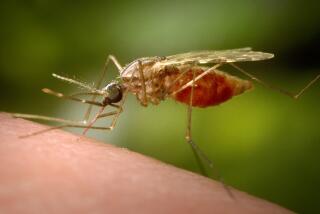Antibody Research Breakthrough Told
- Share via
WASHINGTON — Researchers Friday claimed a breakthrough in the development of disease-fighting human monoclonal antibodies.
Scientists in Schering-Plough Corp.’s Laboratory for Immunological Research in Dardilly, France, said they were able, for the first time, to grow the cells that produce human antibodies in a laboratory culture.
The researchers said they were able to grow B lymphoid cells for up to 10 weeks in a test tube by stimulating them with monoclonal antibodies and exposing them to interleukin-4, a substance previously known to regulate the growth of other types of white blood cells.
Their findings were reported in Friday’s issue of the magazine Science.
Until now, researchers have been unable to grow B cells in the laboratory without first using a virus to transform them into cancer cells.
“This now provides a really big step forward in the ability to grow human B cells for a significant amount of time without transforming them,” said Allan Waitz, head of Dnax Research in Palo Alto, Calif., the Schering-Plough subsidiary that oversees the French laboratory.
The monoclonal antibodies now available for use in humans are produced by genetically altered mouse cells, which makes them more likely to trigger an immune response in patients. This occurs when the body’s disease-fighting mechanisms gear up to reject what they take to be an invading microorganism.
Waitz said the advance was significant both from a scientific point of view and because it provided a possible avenue for enhanced patent protection of monoclonal antibodies developed for therapeutic purposes.
Weaknesses in existing patent law discourage the development of therapeutic monoclonal antibodies, he said.
Waitz said the actual manufacture of human monoclonal antibodies had not yet been achieved but predicted this would take place “in the next several years.”
Monoclonal antibodies are themselves disease-fighting cells that are genetically identical because they are cloned from a single cell.
They are known to medical researchers as “magic bullets” because they hone in on a single foreign invader, such as a virus.
The antibodies are used both to treat medical conditions and to diagnose them.






